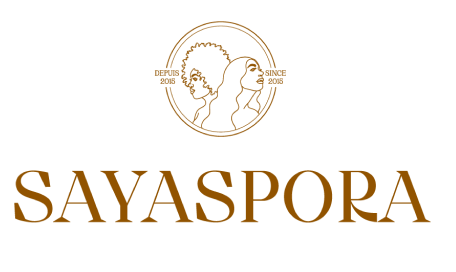October 23, 2021

By Chantal Eyong
One of my favorite Moth stories is Hasan Minhaj’s, “Always Her Hasan-Bhai.” At the beginning of the story, Minhaj recalls his father deciding it was time to tell his son how he met Minhaj’s mother. He heard this story for the first time at 30. He goes on to explain why his dad waited nearly three decades to share this part of his family history. “See, I’m first-generation and my parents are immigrants, and if you know anything about immigrants…they love secrets. They love them! They love bottling them up deep down inside of them and then unleashing them on you thirty years later when it’s no longer relevant. And you’re like, ‘What? Mom’s a communist? Dad’s a ninja? Why are you telling me this right now? This is not the Bourne Identity, why is this happening?”
Hearing this story made me laugh, but it was more than just funny–it made me feel seen. For the first time, I had a label for the gaps and missing stories I wanted, a way of naming my relationship with things unspoken. Those missing stories were my parents’ secrets and my parents were secret makers.
Like Minhaj, my parents are immigrants. I am also first gen. Nearly a decade ago, in an effort to probe my family’s history, I used my experience as a writer and filmmaker to do a documentary on my family. I thought it would be a vehicle to get them talking about their lives and their childhood. These weren’t conversations that would come up at the dinner table and most conversations with my parents were variations of, “How are you?” “Are you eating well?” “Clean the dishes.” For the documentary, I interviewed two of my sisters about whether they felt they knew a lot about our parents. They said no and that they wanted to know more.
So when I sat my mother and father down and began the interview process, I imagined these recordings would start a new chapter of knowledge exchange. I sat them down in our old living room, mic’d them, and adjusted their seats so they could both be in the frame. I couldn’t remember the last time I’d seen them sitting so close to each other. As I delivered the questions, my mom was gentle, more open, giving some information about how they met. She would turn to look at my dad, sharing in a way that was effortless. My dad was more reserved, quieter. At one point, my dad said pointedly, that the questions were intrusive. That moment resonated and made the already tough process of editing matters very close to the heart. Something about the interview and this process of actively wanting to know made me feel embarrassed, as though I did something wrong in desiring. Was it exploitative to record these histories? Feeling awkward, I scrapped the project and deemed it a failure. To this day, I never revisited the recordings and I don’t know where they are. I stopped searching and asking for answers, convinced living without answers was easier. The secret-keeping label made that documentary attempt easier to accept, but it didn’t make sense of the moments when my parents did share voluntarily–on rare occasions as we sat together, doing something mundane like watching television or sitting at the top of the stairs, next to the window overlooking our large backyard.
After leaving Orange, New Jersey in 2012. I moved within two days to Orange County, California, a place I only recognized because of the popular drama with the same name from the early 2000s. The move was abrupt and unplanned. The culture shock, though I moved domestically, carried weight. In California, people smiled, had time to stop and give directions, and actually share insider facts, like the difference between a Southern California Disney Pass and a regular one. As I tried to find a voice in this new language, I also wrestled with homesickness, heartbreak, growing up. Growing up made me quieter. Culture shock made me say less. I wondered if my Dad moved in the same way when he received a visa to enter the country in the early 80s. A nonstop flight from Cameroon, where my father is from, to Newark International Airport was roughly six hours. The flight from Newark to Orange County was the same.
Culture shock catches you off guard because it prompts you to identify things about yourself that once needed no definition — it just was. In kindergarten, I was placed in special education because my culture shock as a first-gen student entering school for the first time led to a consequential shyness. In response, the school concluded I had a learning disability. But toward the end of that school year, I had a 1:1 assessment where I was asked to name my ABCs. Excitedly, unaware of what was going on, but happy to perform, I sang my ABCs and offered to show all the other things I learned in school. The following year, I was no longer in special education class. Remembering this story reminded me of the friction and miscategorizations that occur when your entire existence is nuanced.
Secrets have a tendency to be framed as privileged information not meant for everyone. Secrets can also be a means of survival. Sometimes, however, secrets are just miscategorized, as my mother taught me. About a year ago, while writing a story about my childhood, I thought to ask my mom about hers and her culture. Perhaps it could be something I could use as inspiration, I thought. I called her and asked her about her tribe, Oroko, and how to say “child” in that language. She told me there were different language variations in the Oroko tribe. She then proceeded to speak words with a fluency, in a language I never heard her speak.
Ngana, she told me, means child. When I asked my mom why, for over 30 years, I never heard her speak this language, she responded simply, “it never came up.”
And I understood.

Chantal Eyong
Writer
Chantal is an author, artist and media producer based in Los Angeles, California. Her work focuses on Afro-diasporic narratives in relation to the self, place-making, archives and memory. Chantal holds an MFA in Screenwriting from the University of California Riverside and is currently a doctoral student in the Media Arts + Practice program at the University of Southern California.
Images credits:
Image courtesy of @notion.of.form
Similar articles

December 16, 2024

September 18, 2021



